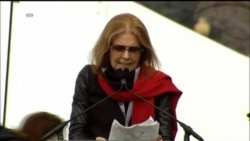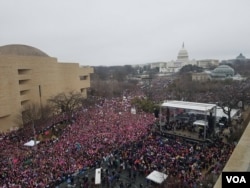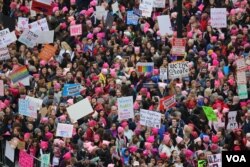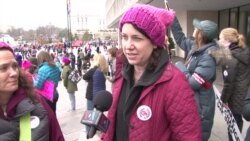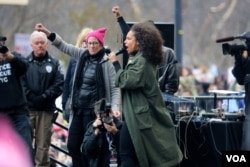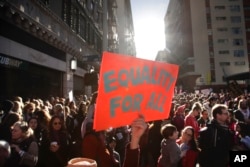Hundreds of thousands of people turned out for a protest march Saturday in Washington, D.C., President Donald Trump's first full day in office, and large crowds gathered in other U.S. cities to dramatize the extent of popular opposition to the new administration and its policies.
Celebrities, entertainers and political activists called for outspoken opposition to Trump's policies on immigration, the environment and women's rights.
Singer and actress Madonna won huge cheers from the crowd in Washington when she unexpectedly appeared near the end of an hourslong rally near the U.S. Capitol. She led the throng in chants of "we choose love" and sang two songs.
WATCH: Madonna addresses Women's March participants
Other celebrities who appeared onstage to cheer on the demonstrators included songwriter Alicia Keyes, actor Scarlett Johansson and R&B artist Maxwell.
Gloria Steinem, a leader of the women's movement in the United States for decades, also was among more than 25 speakers in the nation's capital.
WATCH: Gloria Steinem addresses the crowd
Organizers of the Women's March had planned for a rally near the U.S. Capitol, to be followed by a march to the White House, more than two kilometers away, past many of Washington's historic sights. But the crowd turned out to be larger than expected, organizers rerouted the march. Most of the planned march route along Independence Avenue was filled from curb to curb with people, hours before the march was to begin.
The interim police chief in Washington, Peter Newsham, said, "The crowd stretches so far that there's no room left to march."
As the rally ended after five hours, protesters were fanning out throughout the downtown area.
Republican Martha Ehrmann Conte was one of them, a Republican who joined the march because she says Trump does not represent her values or the values of the Republican party, she joined 35 years ago.
"[Republicans] only differ in the 'how' of achieving many of the same objectives," she told VOA, "Trump doesn’t represent Republicans. He represents his own interests and those of a minority of backward-looking people who are afraid of losing their entitlement."
Rashmi Misra made the trip to the capital from New York City with her 3-year-old daughter as well as her brother, nephew and husband.
"It does not matter who you are or where you're from — dignity is what matters. Rights are what matters," she said. "I just want my daughter to understand that she can't just think of herself as an individual but think of everybody — think about peace and love."
"We thought it was important for our daughter to introduce her to what it means to resist," her husband, Sanjay, added.
WATCH: Protesters on why they are marching
Maggie Klein of Oakton, Virginia, saw a march posting on Facebook and knew she had to go. “What he [Trump] does and says is not the way I raised my kids," she said.
Klein was joined by her teenage children and husband, Stephen. “We just have to keep getting the other point of view out there,” he said.
Trump left the White House before the protesters' scheduled arrival time, for a previously planned visit to CIA headquarters and an address to the intelligence agency's employees.
The Women's March on Washington was echoed in dozens of other American cities.
A crowd of more than 150,000 in Chicago — seven times as large as had been expected — meant that a planned march was turned into a rally.
Another crowd gathered in Los Angeles. In New York City, tens of thousands of people flooded the upscale shopping district along Fifth Avenue, heading toward Trump Tower, the president's home and base of operations before he moved into the White House on Friday.
St. Paul, Minnesota, and Boston were two other cities where crowds of more than 50,000 people were reported.
Tens of thousands of protesters gathered at a rally in Oakland, California.
Jen Tellier from Alameda, California, said, "I'm here because I'm very concerned about Trump and all the changes he and his cronies say they will do right away. This is threatening to Medicare, social security, the environment, education. You name it, I'm worried."
Carolynn and Seth Melchert of Oakland also were in attendance.
"I felt moved to be in solidarity with everyone who has concerns with what the future holds, and hope that as citizens we have power and we stand up for what we believe in," Carolynn Melchert said.
Her husband, Seth, added, "Across the world, millions have put their lives on the line everyday just to survive. This is the least I can do. I'm prepared to put myself on the line more than I normally am called to do in America.”
Many of the women marching in Washington and other cities wore knitted pink "pussycat" hats, featuring small cat-like ears, to show their solidarity with the anti-Trump sentiments and also as an oblique reference to vulgar comments Trump was known to have made years before he entered politics. They carried signs protesting against what they denounced as the administration's anti-woman policies.
Carolyn Presutti and Brian Allen contributed to this report, as did VOA's Michelle Quinn in Oakland, California.







